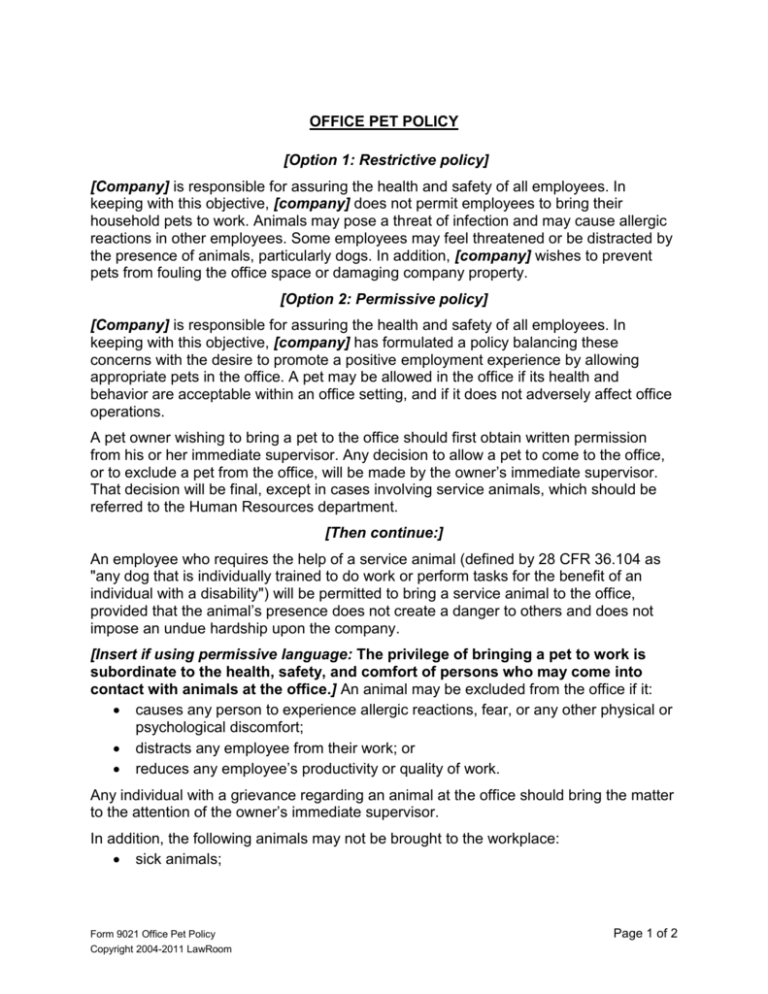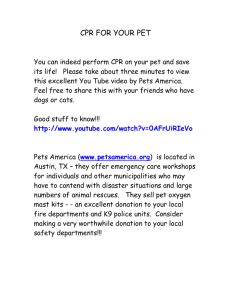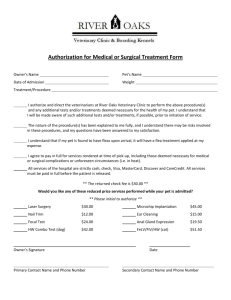office pet policy
advertisement

OFFICE PET POLICY [Option 1: Restrictive policy] [Company] is responsible for assuring the health and safety of all employees. In keeping with this objective, [company] does not permit employees to bring their household pets to work. Animals may pose a threat of infection and may cause allergic reactions in other employees. Some employees may feel threatened or be distracted by the presence of animals, particularly dogs. In addition, [company] wishes to prevent pets from fouling the office space or damaging company property. [Option 2: Permissive policy] [Company] is responsible for assuring the health and safety of all employees. In keeping with this objective, [company] has formulated a policy balancing these concerns with the desire to promote a positive employment experience by allowing appropriate pets in the office. A pet may be allowed in the office if its health and behavior are acceptable within an office setting, and if it does not adversely affect office operations. A pet owner wishing to bring a pet to the office should first obtain written permission from his or her immediate supervisor. Any decision to allow a pet to come to the office, or to exclude a pet from the office, will be made by the owner’s immediate supervisor. That decision will be final, except in cases involving service animals, which should be referred to the Human Resources department. [Then continue:] An employee who requires the help of a service animal (defined by 28 CFR 36.104 as "any dog that is individually trained to do work or perform tasks for the benefit of an individual with a disability") will be permitted to bring a service animal to the office, provided that the animal’s presence does not create a danger to others and does not impose an undue hardship upon the company. [Insert if using permissive language: The privilege of bringing a pet to work is subordinate to the health, safety, and comfort of persons who may come into contact with animals at the office.] An animal may be excluded from the office if it: causes any person to experience allergic reactions, fear, or any other physical or psychological discomfort; distracts any employee from their work; or reduces any employee’s productivity or quality of work. Any individual with a grievance regarding an animal at the office should bring the matter to the attention of the owner’s immediate supervisor. In addition, the following animals may not be brought to the workplace: sick animals; Form 9021 Office Pet Policy Copyright 2004-2011 LawRoom Page 1 of 2 animals with fleas or any disease that is communicable to other animals in the office or to humans; animals that have not been properly vaccinated, or that have internal or external parasites; dogs that bark or behave aggressively; or animals that foul the inside or outside of the building. Animals that have not been spayed or neutered will not be permitted to come to the office in season. All dogs must be leashed at all times. All animals must be in the continuous full control of their owners. They should be in the physical presence of the owner, in the owner’s office, or in the space around the owner’s desk at all times. Owners are expected to clean up, completely and immediately, after their animals. An employee who brings an animal to the office is completely and solely liable for any injuries or any damage to personal property caused by the animal. Any repair or cleaning/maintenance costs incurred by an animal will be charged in full to the owner. [Company] may, at its discretion, require animal owner to maintain a liability insurance policy covering damage or injuries caused by the animal while at the office. The company may specify minimum coverage amounts under such a policy, and may require the owner to pay for such coverage. [Company] shall not be liable for loss of, or injury to, any animal brought to the office. Form 9021 Office Pet Policy Copyright 2004-2011 LawRoom Page 2 of 2






